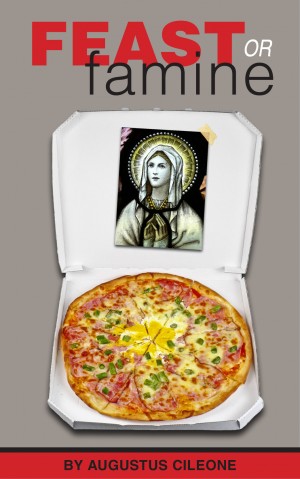
The novel is structured as though we are reading a transcript of reflective conversations recorded in 1987 between an adult Michael and Ambrosia, a close friend. While Ambrosia is a psychiatric professional, she is not officially his therapist. This softens the story a bit so it doesn’t devolve into self-help pseudo-memoir territory.
Michael begins his reflections in the 1950s with a focus on food as it relates to his family (Italian), his neighborhood (South Philadelphia), and his religion (Catholic). He turns 12-years-old in 1963, when America begins to experience a series of traumas resulting in great social upheaval. Up until then, his parents have provided for his needs and given him a sense of security, in spite of being very judgmental.
Everything changes when President Kennedy is assassinated in November, and the psychic hits just keep coming. Over the next few years, Michael watches coverage of the Vietnam War and Civil Rights movement on television. He also watches in horror as his friend Vince Bisogno practices extreme promiscuity and drops out of high school. Michael starts comparing the bigoted attitudes of his neighbors and relatives to the lyrics of Bob Dylan and other musicians being played on FM radio and Vince is disgusted by reports of atrocities in Vietnam.
Tom Perdito from across the street becomes Michael’s concert buddy in the late Sixties. When Tom quits his office job, Michael is concerned for the future, but Tom just wants to go to see the musical Hair. Together Vince and Tom initiate Michael into the marijuana experience, but as his buddies are becoming aimless, Michael enrolls in college in 1968. While studying English literature, he participates in an anti-war demonstration, studies world religions, and reads Karl Marx. In his second year of college, Michael’s friend Nick Battaglia gets beaten at a demonstration on campus and Tom comes out as gay. Everyone is questioning everything and the Seventies aren’t any easier.
Michael, his relatives, and personal friends collectively live through society’s greatest changes during the Sixties, Seventies, and early Eighties. Also, there is a special woman in Michael’s life throughout all of this whom he had met at a neighborhood bakery when they were children and they later attend the same high school and college. Their relationship becomes as complicated as the social struggles of their generation during the referenced time period. The plot might sound vaguely similar to Forrest Gump but there are some important distinctions.
The food motif of Feast or Famine is consistent in both the macrocosm and microcosm of Michael’s life. The novel’s main theme is surviving trauma on a social or personal level and often both. The story’s premise is that Michael is recovering from a specific event in the early Eighties that sends him into an emotional coma, an event he is unprepared to assimilate after all he’s been through. He’s had a questioning mind all his life, but the answers he gets back “appeared to me like ‘Don’t Enter’ signs on my road to understanding why things were the way they were.”
Michael Accordo is not Forrest Gump. Michael is keenly aware of and in fact becomes physically possessed by the existential angst and spiritual confusion of the Baby Boomer generation. How he will manage to untangle himself and reclaim his soul is one of the reasons the reader will keep turning the pages of Feast or Famine, which is not to say the novel is as heavy as a classic Italian dinner. Augustus Cileone cooks up this tale with a good balance of humor, history, lively characters, and wistful honesty. Five stars.
Links
Get an Editorial Review | Get Amazon Sales & Reviews | Get Edited | Get Beta Readers | Enter the SPR Book Awards | Other Marketing Services






















Leave A Comment